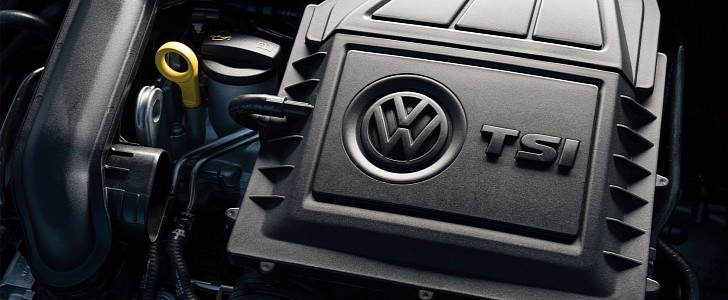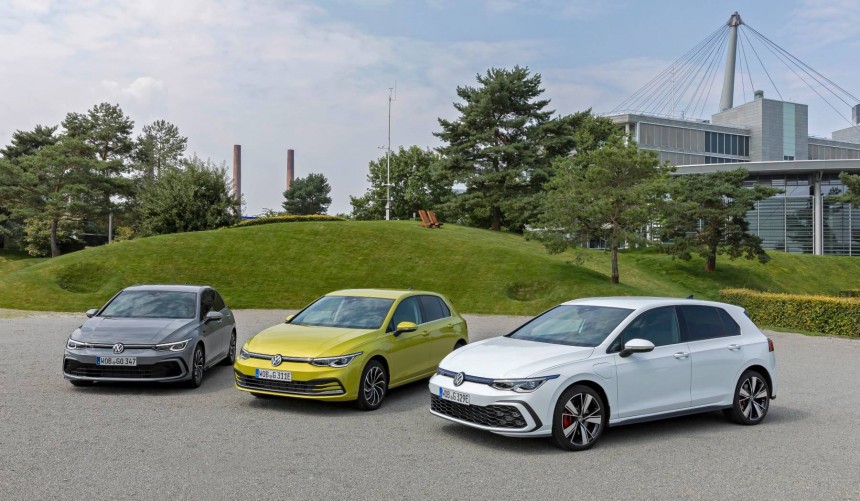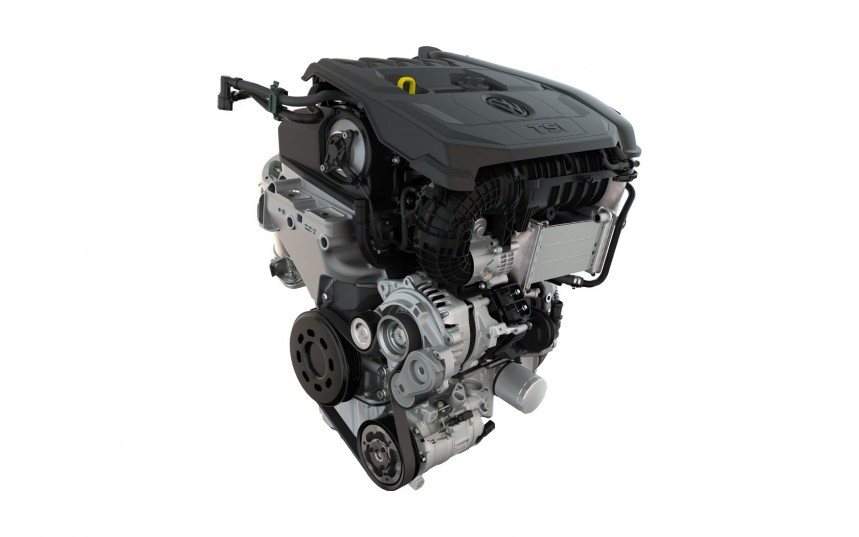The quest to provide more efficient internal combustion engines has led Volkswagen Group to develop a compact line of petrol TSI evo engines available on most of its models, from the tiny Up! GTI to the mid-size Passat family car - not to mention a flurry of other models from the Skoda, SEAT and Audi brands.
The acronym TSI stands for turbocharged stratified injection, indicating a combination of efficient forced induction and direct fuel injection. With 15 years of experience developing these units, Volkswagen has enhanced the latest versions with advanced technologies, enabling the use of compact 1.0-liter 3-cylinder and 1.5-liter 4-cylinder TSI evo engines on a wide range of vehicles that include the Passat, T-Cross or Tiguan.
Although small, these highly efficient powerplants can provide sufficient power. The 1.0 TSI evo’s maximum output ranges from 90 PS (89 hp/66 kW) to 115 PS (113 hp/85 kW), while the 1.5 TSI evo generates 130 PS (128 hp/96 kW) or 150 PS (148 hp/110 kW).
To further increase power and efficiency, the TSI evo engines are also available with 48-volt mild-hybrid systems. On the Golf, for example, the 1.0-liter unit combined with the MHEV system generates 110 PS (108 hp/81 kW) and 200 Nm (148 lb-ft) of constant torque. That is more than enough to propel the hatchback to a top speed of 202 kph (126 mph) while the claimed average full consumption stands at only 4.5 l/100 km (63 mpg US).
The three and four-cylinder units are also designed to work with natural gas as TGI engines. They are available on the European Golf and Polo models in this bi-fuel configuration as well.
The two compact powerplants trace their origins to the EA 211 engine family, which debuted on the seventh generation Golf in 2012. Four years later, the 4-cylinder units were completely overhauled, with their previous displacements of 1.4 and 1.2 liters being standardized at 1.5 liters. These upgrades were also integrated into the 1.0-liter 3-cylinder which was launched in 2019, with both units receiving the EA 211 TSI evo designation.
Depending on the number of cylinders and their power output, the powerplants incorporate various technological elements. The 130 PS (128 hp/96kW) 4-cylinder and the 3-cylinder variants use a combustion process based on the Miller cycle. This helps reduce fuel consumption, particularly at low RPMs, by closing the inlet valves and thus reducing throttle losses. This also enables a high compression ratio, which stands at 12.5:1 in the 4-cylinder and 11.5:1 in the 3-cylinder engine.
To prevent lower fresh gas volume to reduce power output and torque, they use a precise hydraulic system that enables the inlet and exhaust camshafts to be continuously adjusted.
The turbochargers feature variable geometry, which means they can withstand charge pressures up to 2.3 bar (33 psi) in the 130 PS (128 hp/96 kW) 4-cylinder or 2.8 bar (40 psi) in the smaller 3-cylinder.
To increase efficiency, the 1.5 TSI evo also uses the innovative Active Cylinder Management (ACT) technology. It shuts down the second and third cylinders at low to medium RPMs by deactivating injection, ignition, and the valve gear.
All TSI evo engine variations use a highly efficient common rail injection system that runs at a maximum pressure of 350 bar (5,076 psi), delivering up to five injections per cycle. Raw emissions are kept at low levels, and a particulate filter mounted directly downstream of the engine retains almost all remaining harmful particles from the exhaust gas.
The compact units are also extremely light due to the use of lightweight materials like an aluminum crankcase. Thus, the 1.0-liter 3-cylinder only weighs 88 kg (194 lbs).
The Volkswagen Group is focused on electrification and will slowly phase out ICEs, but in the meantime, the TSI evo lineup offers some of the most efficient and clean petrol engines in the industry.
Although small, these highly efficient powerplants can provide sufficient power. The 1.0 TSI evo’s maximum output ranges from 90 PS (89 hp/66 kW) to 115 PS (113 hp/85 kW), while the 1.5 TSI evo generates 130 PS (128 hp/96 kW) or 150 PS (148 hp/110 kW).
The three and four-cylinder units are also designed to work with natural gas as TGI engines. They are available on the European Golf and Polo models in this bi-fuel configuration as well.
The two compact powerplants trace their origins to the EA 211 engine family, which debuted on the seventh generation Golf in 2012. Four years later, the 4-cylinder units were completely overhauled, with their previous displacements of 1.4 and 1.2 liters being standardized at 1.5 liters. These upgrades were also integrated into the 1.0-liter 3-cylinder which was launched in 2019, with both units receiving the EA 211 TSI evo designation.
Depending on the number of cylinders and their power output, the powerplants incorporate various technological elements. The 130 PS (128 hp/96kW) 4-cylinder and the 3-cylinder variants use a combustion process based on the Miller cycle. This helps reduce fuel consumption, particularly at low RPMs, by closing the inlet valves and thus reducing throttle losses. This also enables a high compression ratio, which stands at 12.5:1 in the 4-cylinder and 11.5:1 in the 3-cylinder engine.
To prevent lower fresh gas volume to reduce power output and torque, they use a precise hydraulic system that enables the inlet and exhaust camshafts to be continuously adjusted.
The turbochargers feature variable geometry, which means they can withstand charge pressures up to 2.3 bar (33 psi) in the 130 PS (128 hp/96 kW) 4-cylinder or 2.8 bar (40 psi) in the smaller 3-cylinder.
All TSI evo engine variations use a highly efficient common rail injection system that runs at a maximum pressure of 350 bar (5,076 psi), delivering up to five injections per cycle. Raw emissions are kept at low levels, and a particulate filter mounted directly downstream of the engine retains almost all remaining harmful particles from the exhaust gas.
The compact units are also extremely light due to the use of lightweight materials like an aluminum crankcase. Thus, the 1.0-liter 3-cylinder only weighs 88 kg (194 lbs).
The Volkswagen Group is focused on electrification and will slowly phase out ICEs, but in the meantime, the TSI evo lineup offers some of the most efficient and clean petrol engines in the industry.











